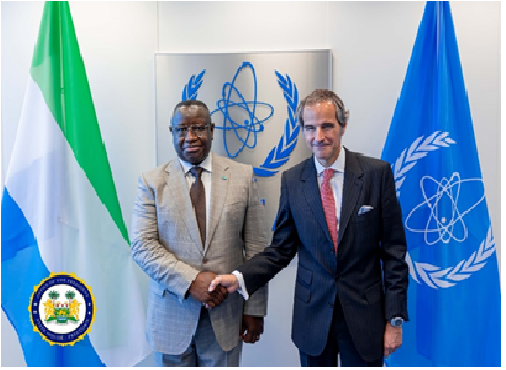AYV News, June 26, 2024
His Excellency President Dr Julius Maada Bio has held a productive bilateral meeting with the Director General of the International Atomic Energy Agency, IAEA, Rafael Mariano Grossi, at their headquarters to deepen collaboration between Sierra Leone and IAEA.
After welcoming President Bio, the IAEA DG stated that he was extremely delighted to be associated with his visit to Vienna, adding that he was also impressed with his visionary statement at the Investment Roundtable hosted by the OPEC Fund for International Development.
Mr Grossi pointed out that the three areas to deepen collaboration would focus on energy, healthcare and food security, using nuclear technology. He committed to supporting the President with capacity building and an assessment mission to Sierra Leone to further explore the three areas of interest.
In his remarks, His Excellency President Julius Maada Bio thanked the Director General for his reception and noted that those areas of interest for collaboration aligned with his vision for food security, access to energy and healthcare. He expressed the hope that the use of nuclear techniques would accelerate results in those key areas.
Sierra Leone became a member state of the IAEA since 1967 and has benefitted from technical cooperation programmes over the years, including project successes in livestock production, radiotherapy and nuclear medicine and crop improvement.
In another engagement, President Bio addressed the third development forum hosted by the OPEC Fund for International Development (OFID), proposing ways developing countries may deal with multifaceted and interconnected challenges around economic inequality, climate change, health crises and educational deficits.
“Currently, Developing Countries must deal with the ravages of climate change, persistent hyperinflation, negative externalities of the war in Ukraine, Gaza, and parts of Africa, growing mistrust among nations, and pervasive domestic inequalities fuelled by the emerging nationalism and anti-immigrant posture of wealthy nations.
“Yet, these challenges also present us with an opportunity to forge stronger partnerships and devise innovative solutions that can drive sustainable and inclusive growth,” he noted.
The President, therefore, reminded of the pressing need to accelerate their efforts toward achieving the Sustainable Development Goals by 2030, citing the Global Stocktake Report presented at COP28, which indicated that a significant number of countries were not on track to achieve the SDGs by 2030.
“The time to act is now. The urgency of the situation demands that we transform our grand declarations and massive commitments into concrete support for Developing Countries and vulnerable communities that depend on us.
“Your Excellencies, ladies and gentlemen, one of the fundamental pillars of sustainable development is the strength of our institutions. This requires robust legal frameworks and regulatory policies that are not just bureaucratic necessities.
“We have seen success in human capital development through various projects in our member and partner countries. In Sierra Leone, we have made human capital development the cornerstone of our Development Agenda. In the past six years, we have introduced free education for primary and secondary schools, which has added over one million more pupils to schools.
“Though we have made some gains in these sectors, we are constrained by our lack of financial resources to scale up our successes. Our gains in human capital development are at risk of being terminated because of a lack of funding, stalled economic growth due to global tensions, and the impacts of climate change.
“…let us remember the interconnectedness of this year’s OFID Development Forum’s main themes: enhancing institutional capacity, accelerating infrastructure development, and investing in human capital. These elements are not just related; they are interdependent and crucial for our collective success,” he concluded.

